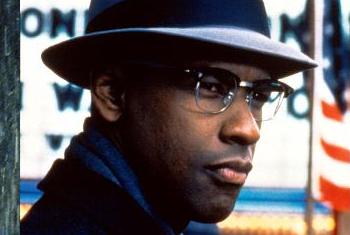Movies can be many things to many people. A movie can entertain you, make you think, move you, make you laugh, thrill you, heck, change your life. And then there’s movies like “Malcolm X”, “Schindler’s List” and a few others, movies that are essential, plain and simple. Spike Lee’s glorious biography of Malcolm Little is especially important since the controversial moral leader is being erased out of history, not only by his opponents but also by his own peers, by people who failed to really listen to his message. I mean, I actually am Black and I didn’t even know what X was really all about. Hardly ever heard him mentioned in school, nor in the mainstream media. Darn, I even bought a few copies of the Final Call, the paper of the nation of Islam, and these guys, his supposed friends, plaster the publication with pictures and speeches of Elijah Muhammad and Louis Farrakhan but never even acknowledge X. Hence, it took this movie to finally know.
Even beyond politics, “Malcolm X” is an exceptional film. Adapted by Lee and Arnold Perl from X’s autobiography, the film achieves to capture the scope of a lifetime. The film is an epic à la “Goodfellas” which doesn’t follow storytelling conventions, not always using chronological order of events to illustrate more clearly certain points. This is not quite Lee’s most powerful film (I don’t believe he’ll ever top “Do the Right Thing”), but it’s certainly his most ambitious. His direction is dynamic (though still not as smooth as it could be), and the film benefits from very textured photography and soulful music from the likes of Duke Ellington, Ella Fitzgerald, Ray Charles, Aretha Franklin and Billie Holliday. But more than a well crafted flick, “Malcolm X” is an intelligent, thought-provoking and surprisingly objective and unbiased character study.
Malcolm X is brilliantly portrayed by Denzel Washington, an extremely versatile actor who’s always convincing through all of X’ changes. The son of a minister who was murdered by the Klan, Malcolm Little was put in a foster home. He was the brightest student in his classes, but his white teachers kept telling him that the best a Negro could hope for was to earn a living working with his hands. And so Little grew up to become a poor working man, until he was tempted to take the only way out he could think out: crime. He quickly became a small-gangster, orchestrating illegal gambling, doing drugs and staging various robberies. He also indulged in making a white woman his lover and partner, and when they got caught, the film tells us, Malcolm received the most of his sentence more for sleeping with the white woman than for the robberies.
Being sent to prison was the best thing that ever happened to Little, as it is where fellow inmate Baines teaches him about the Muslim nation, a group of smart Black people who try to save themselves with spirituality and knowledge. Mostly, Malcolm realizes how the Black man has been brainwashed by his White slave masters into thinking he is inferior. There’s a particularly eye-opening scene in which Baines points out to Malcolm how the dictionary definition of black contains the word wicked, bad and dirty, while the definition of white is all about innocence and honesty. Gradually, Little becomes more educated and conscious, thanks to the teachings of the nation of Islam and its leader, Elijah Muhammad, who becomes his inspiration. He abandons the poisons that are supposedly cigarette, drugs, liquor and pork and white women, as well as his slave name, becoming Malcolm X.
When he’s released from imprisonment, Malcolm X is a righteous man dedicated to Allah. He’s determined to spread his new knowledge, and he does, first out on street corners and church porches and gradually in assemblies, in universities and even in the media. A charismatic moral leader, he becomes Muhammad’s most high-profile minister. Spike Lee shows us a lot of scenes in which we can see and hear X speaking out, and if some of what he says is a bit extremist, a great deal of it makes a lot of sense. Even more interesting is seeing how Malcolm X takes a pilgrimage at the Mecca and realizes that Islam unites people of all races. He who used to talk about black supremacy and call the white man the Devil begins to see that there is good and bad in everyone. It becomes even more obvious when, after he starts distancing himself from radical Muslim thinking, Muhammad and others literally betray him (for those not familiar with Muhammad’s word, know that he actually thought that the solution to racial problems is to separate America in two different nations and put all the blacks together in one corner and all the whites in the other).
Malcolm X was eventually killed for his beliefs and disowned by the very people he fought for. What the film shows us is how this man, often perceived as an extremist and a hate-monger, was actually a brilliant thinker who went through many transformations and ended up a true civil rights hero, despite what many pretend. This also goes for Spike Lee’s film, which is much less angry than you might think. Like all his films, “Malcolm X” isn’t pro-Black or anti-White: it has the intelligence to see the nuances in everyone. You’ve got to see “Malcolm X”, for it makes you understand the hell Afro-Americans went through without encouraging violence, but understanding and empathy.

